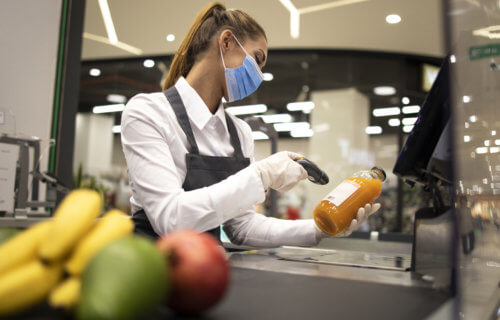BOSTON, Mass. — While workers in all occupations are at risk from coronavirus, there are few who interact with as many people as grocery store workers. A concerning study finds one in five grocery store employees has tested positive for COVID-19. More importantly, researchers say most of these workers have no symptoms.
A team of researchers in the Boston area reveals these essential workers, particularly ones serving customers, are five times as likely to have COVID-19 than other employees. Of the 104 workers examined from a Boston grocery, 20 had a positive coronavirus test. Of that group, a staggering 76 percent were asymptomatic.
Before testing these grocery workers, the study also gave the employees a questionnaire on their lifestyles, medical histories, job histories, and roles in the store. The worked also supplied data on their commute and social distancing efforts as well. From this information, 91 percent of the workers with COVID-19 had jobs that involving interacting with customers.
“This is the first study to demonstrate the significant asymptomatic infection rate, exposure risks, and associated psychological distress of grocery retail essential workers during the pandemic,” researchers say in a media release.
“Once essential workers are infected with SARS-CoV-2, they may become a significant transmission source for the community they serve.”
Grocery store employees feeling mental health strain
The study also reveals many of these grocery store workers are feeling the strain of the pandemic. Of the 99 workers who filled out mental health questionnaires, 24 reported having at least mild anxiety. Nearly half (46%) add they are not able to practice proper social distancing at work.
The survey findings reveal eight of the workers suffered from mild depression. These employees were found to socially distance less and travel more often on public transportation than non-depressed workers. Employees commuting to work by car, bike, or on foot are 90 percent less likely to report symptoms of depression.
Researchers caution that their results come from just one store and a small sample size. They do say the study reveals a reason for government officials and even businesses to act proactively to curb the spread.
“The policy recommendations that employers and government officials should take actions on implementing preventive strategies and administrative arrangements, such as methods to reduce interpersonal contact, repeat and routine SARS-CoV-2 employee testing, to ensure the health and safety of essential workers,” researchers report.
“Our significant mental health finding calls for action in providing comprehensive employee assistance services to help essential workers cope with the psychological distress during the COVID-19 pandemic.”
The study appears in the journal Occupational & Environmental Medicine.
